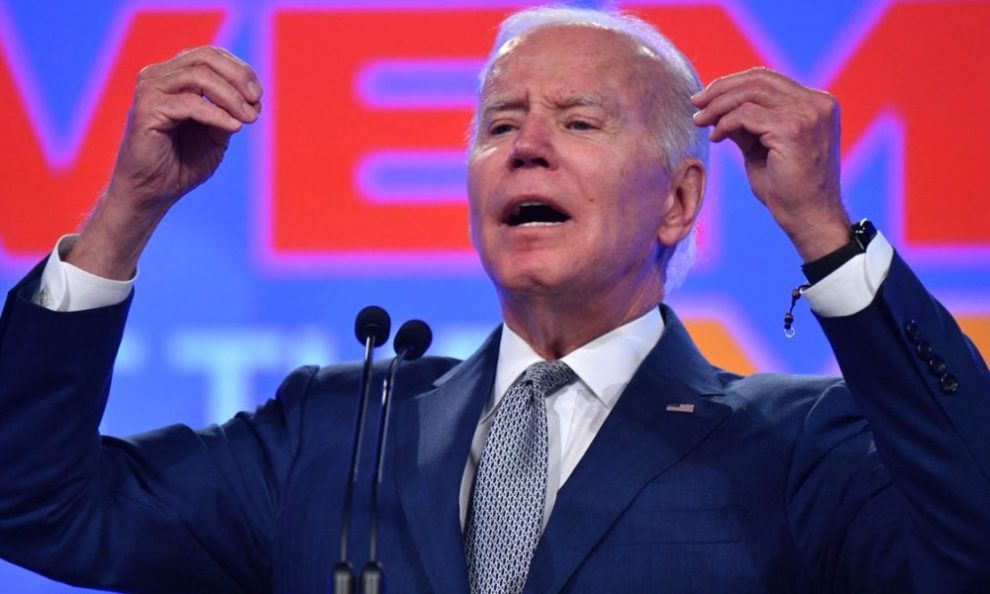President Joe Biden mocked the CEO of a major U.S. company Tuesday afternoon after the company proposed solutions to help lower gas prices as American families suffer pain at the pump.
Biden’s remarks were aimed at Chevron CEO Michael Wirth, who said that his company’s mission was to “work every day to help provide the world with the energy it demands and to lift up the lives of billions of people who rely on these supplies.”
Wirth said that Chevron wants to assist the Biden administration in fighting soaring fuel costs, but that the administration “has largely sought to criticize, and at times vilify, our industry.”
“These actions are not beneficial to meeting the challenges we face and are not what the American people deserve,” he wrote. “We need clarity and consistency on policy matters ranging from leases and permits on federal lands, to the ability to permit and build critical infrastructure, to the proper role of regulation that considers both costs and benefits. Many of these elements are described in our industry’s recently released 10-point plan.”
Biden responded to Wirth’s remarks by mocking him, saying that “he’s mildly sensitive.”
“I didn’t know they’d get their feelings hurt that quickly. Look, we need more refining capacity. This idea that they don’t have oil to drill and to bring up is simply not true.”
Mike Sommers, President and CEO of the American Petroleum Institute (API), the only national trade association that represents all aspects of America’s oil and natural gas industry, released a 10-point plan last week to combat rising fuel costs.
“Your administration has restricted oil and natural gas development, canceled energy infrastructure projects, imposed regulatory uncertainty, and proposed new tax increases on American oil and gas producers competing globally,” Sommers said in a letter. “Respectfully, the American people need a different direction to solve this crisis.”
API’s 10-point plan includes:
Lift Development Restrictions on Federal Lands and Waters
The Department of the Interior (DOI) should swiftly issue a 5-year program for the Outer Continental Shelf and hold mandated quarterly onshore lease sales with equitable terms. DOI should reinstate canceled sales and valid leases on federal lands and waters.
Designate Critical Energy Infrastructure Projects
Congress should authorize critical energy infrastructure projects to support the production, processing, and delivery of energy. These projects would be of such concern to the national interest that they would be entitled to undergo a streamlined review and permitting process not to exceed one year.
Fix the NEPA Permitting Process
Your administration should revise the National Environmental Policy Act (NEPA) process by establishing agency uniformity in reviews, limiting reviews to two years, and reducing bureaucratic burdens placed on project proponents in terms of size and scope of application submissions.
Accelerate LNG Exports and Approve Pending LNG Applications
Congress should amend the Natural Gas Act to streamline the Department of Energy (DOE) to a single approval process for all U.S. liquefied natural gas (LNG) projects. DOE should approve pending LNG applications to enable the U.S. to deliver reliable energy to our allies abroad.
Unlock Investment and Access to Capital
The Securities and Exchange Commission should reconsider its overly burdensome and ineffective climate disclosure proposal and your administration should ensure open capital markets where access is based upon individual company merit free from artificial constraints based on government-preferred investment allocations.
Dismantle Supply Chain Bottlenecks
You should rescind steel tariffs that remain on imports from U.S. allies as steel is a critical component of energy production, transportation, and refining. Your administration should accelerate efforts to relieve port congestion so that equipment necessary for energy development can be delivered and installed.
Advance Lower Carbon Energy Tax Provisions
Congress should expand and extend Section 45Q tax credits for carbon capture, utilization, and storage development and create a new tax credit for hydrogen produced from all sources.
Protect Competition in the Use of Refining Technologies
Your administration should ensure that future federal agency rulemakings continue to allow U.S. refineries to use the existing critical process technologies to produce the fuels needed for global energy markets.
End Permitting Obstruction on Natural Gas Projects
The Federal Energy Regulatory Commission should cease efforts to overstep its permitting authority under the Natural Gas Act and should adhere to traditional considerations of public needs as well as focus on direct impacts arising from the construction and operation of natural gas projects.
Advance the Energy Workforce of the Future
Congress and your administration should support the training and education of a diverse workforce through increased funding of work-based learning and advancement of STEM programs to nurture the skills necessary to construct and operate oil, natural gas, and other energy infrastructure.
Story cited here.
























